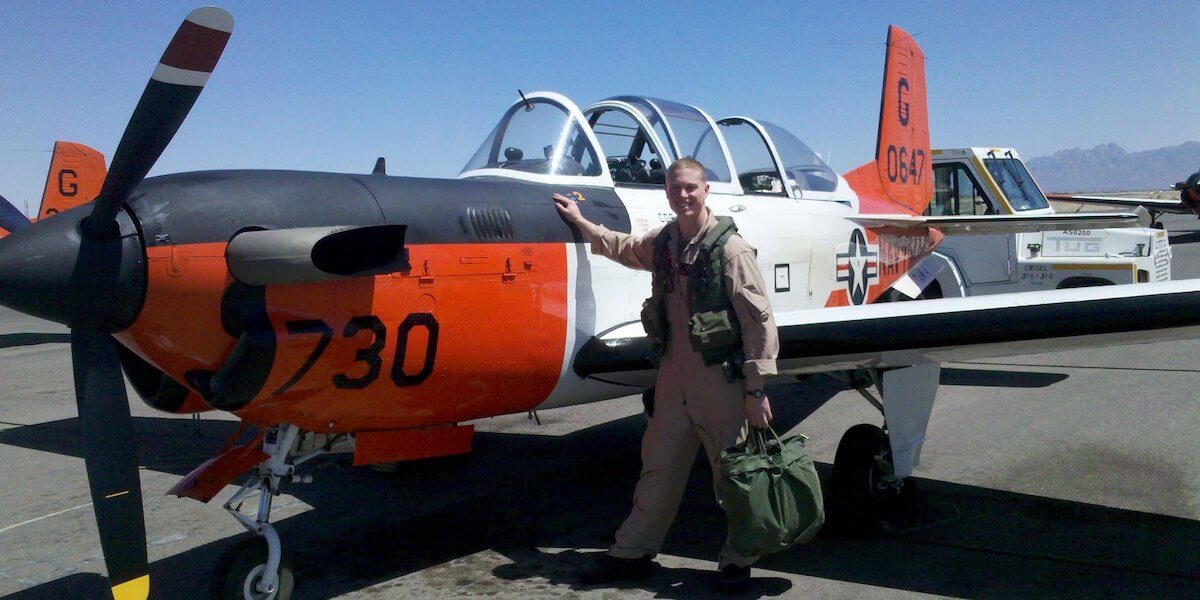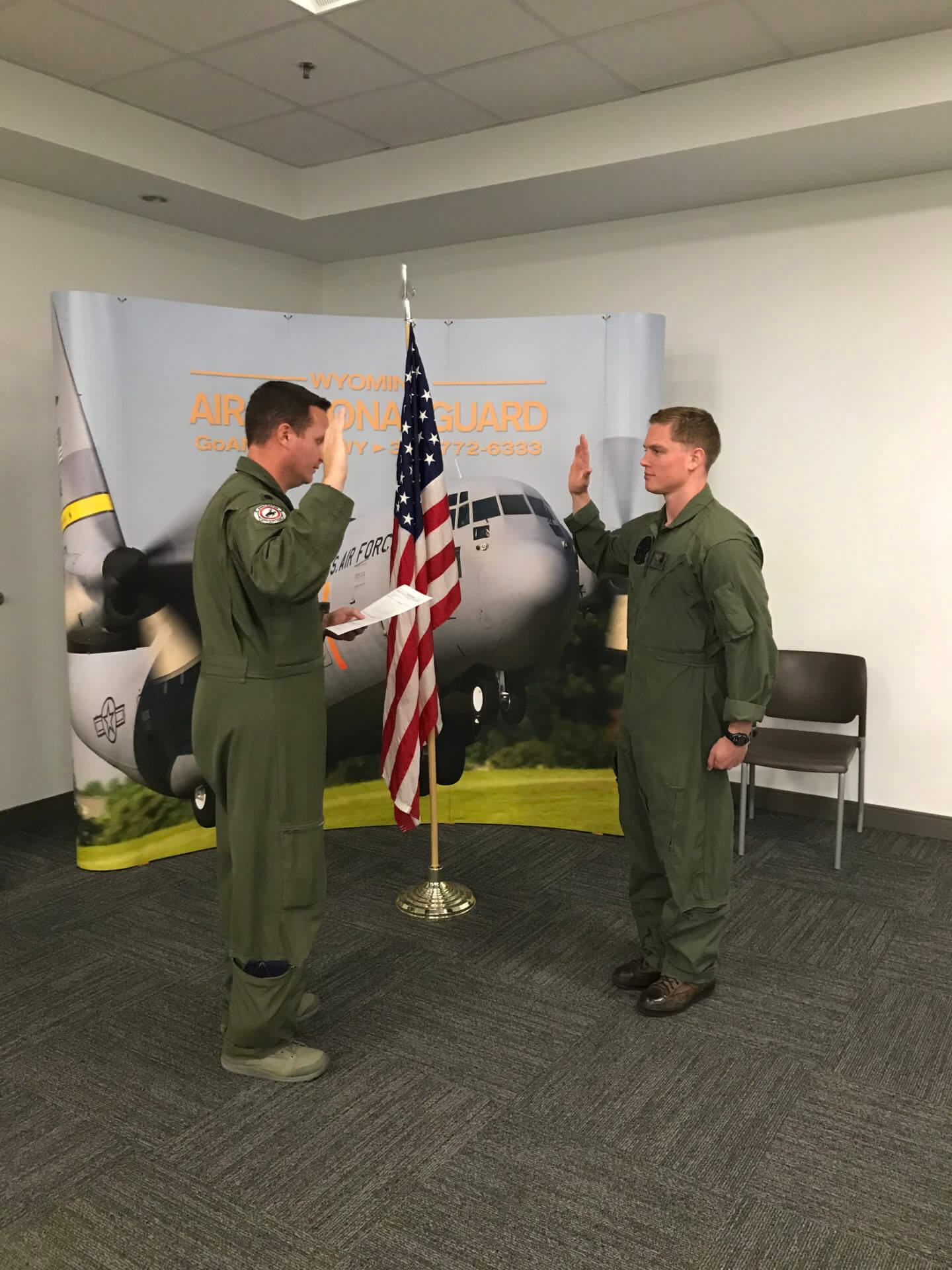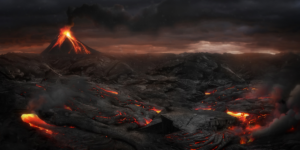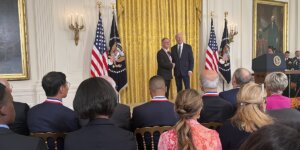
U.S. Air Force officer, Captain Edward Proulx after his first acrobatic solo in flight school when he was then a Marine Aviator, 2nd Lt. in Las Cruces, NM. (Photo/Courtesy of Edward Proulx)
Edward Proulx, a master’s student in the Department of Astronautical Engineering at USC Viterbi, always knew that he wanted to fly airplanes. After running into a Marine Officer recruiter at the University of Connecticut as an undergrad, he decided to join. “I figured why not and went to officer training over the summer of my junior year,” Proulx said.
After graduating from initial officer training, Proulx trained as an assault support/MV-22 pilot. He has served in the Marine Corps for nearly a decade, been deployed twice overseas with VMM-365 (REIN) and the 24th Marine Expeditionary Unit (MEU), before accepting his final assignment in the Marine Corps as an operational test pilot at VMX-1. Proulx recently transferred to the Air Force and now serves part time as a captain in the Wyoming Air National Guard as a mobility/C-130H pilot. He additionally works as missions assurance manager at Ball Aerospace in Westminster, Colorado .
Proulx has always dreamed of becoming an astronaut and going to space but lacked the requisite master’s degree to become a candidate. That’s why he decided to come to USC Viterbi.
Today, Proulx balances his engineering studies with two demanding careers and continues to dream of getting to work and live in space. He recently spoke to USC Viterbi.
What was life like in the Marine Corps? Perhaps walk us through a daily routine?
As an assault support pilot, our primary mission was to provide air support to our brother-and-sister Marines on the ground. This meant flying Marines and cargo wherever they needed to go. A typical day, when not on deployment, would involve a training flight where we would go out and practice the basics of providing this support. We might do landings into a confined area, landings to a ship off the coast, practice aerial refueling or just work on flying in a formation at night. The flying, which was definitely the best part, was only a small portion of a typical day. The rest of the time was doing the planning to go flying or taking care of the administrative responsibilities that go along with running any organization.
What is one of your fondest memories of your time in the Marine Corps?
There are too many memories. But definitely the people and the trust we placed in our fellow service members are what stick out the most. Marine aviation, and the Marines in general, are filled with incredible people who you can count on no matter what. I remember one instance when we were going to take off to fly over water a very long distance with no opportunity to divert our plane if the tanker support plane did not show up. We were counting on that tanker crew to be there, and they were. We would routinely make agreements with other units to show up exactly at a specific time, with incredible consequences if they or we didn’t show up. It’s rare to be part of an organization where you can put your life into someone else’s hands solely on the basis of them saying, “I will be there,” and trust that they will show up, but we did it all the time.
What made you want to return to school and want to be part of the Trojan family?
It took me a long time to decide to go back to school because I wanted to be sure that I was really doing something that I loved. It’s all too easy to spend a significant portion of your life doing something you only sort-of like, but don’t truly don’t enjoy. I always knew I was interested in space but never decided to act on my interest. One day while on a ship during my second deployment I had a realization that “I really would love to be in space.” As a kid I would watch shuttle launches and read science fiction books including “The Right Stuff” by Tom Wolfe, and I realized I wanted to go back to school to pursue my dreams of becoming an astronaut.
When I did, I looked around and realized that USC is one of the very few schools in the country with a pure astronautical engineering department, which was a huge determining factor. On top of that, the DEN (USC Viterbi’s Distance Education Network) program allows students like me to either stay in service or continue full time employment.
Why did you decide to pursue Engineering?
I have always had a fundamental curiosity about understanding how and why things work. An engineering education gives us the capability to begin to understand the world around us. But by being able to pursue engineering, it brings me one step closer to my dream.
What do you enjoy the most at USC Viterbi?
So far, I have most enjoyed the quality of the education and the dedication of my teachers, TA’s and classmates. Thanks Thomas and Paige! Everyone at USC has been extremely supportive. This is especially true at times when being a DEN student can make it hard to interact with people at USC compared to traditional on-campus students. It is also fun to get exposed to a lot of different people and different viewpoints. One professor actually, Mike Gruntman, (professor of astronautics and aerospace and mechanical engineering), especially encouraged and motivated me by connecting me with another Marine aviator who similarly completed the M.S program. This may sound weird, but I actually enjoy getting to work on math homework problems, which you don’t get to do too much of as a pilot or manager.

Edward Proulx (right) gets sworn into the Air Force by LtCol Gobel (left). (Photo/Courtesy of Edward Proulx)
What’s next for you? What does your future look like?
I recently did an inter-service transfer from the Marine Corps to the Air Force to a unit in Wyoming. That unit, the 187th A/S, is going to send me back to flight school soon to learn how to fly the C-130H, so I am looking forward to that.
Thinking about the long term and my future, l am aiming to finish my masters and to ultimately work for NASA, hopefully as a research test pilot, or even better, an astronaut. At the end of the day, I just want to be as close to space exploration as I possibly can and to support all of our space efforts to the best of my ability.
What does Veterans Day mean to you?
Veterans Day is a day to remember the sacrifices that we have asked our service members to make. But more importantly, it is a day for us to think about our involvement in the process that determines what sacrifices our service members are asked to make on our behalf. Do you say thanks for your service but forget to vote? Do you put a yellow ribbon bumper sticker on your car but don’t follow the news? Service members need the engagement, participation and ultimately the judgement of the citizens that they serve in order to ensure that the reasons that we are employed are the right ones. We simply cannot and should not make these determinations without the input of our citizens to determine the lives of service members. The stuff that really matters is paying attention, educating yourself on the facts and making the hard decisions. So, if you haven’t done it already, please make sure to always stay informed and vote! Your participation can have a positive impact.
Published on November 7th, 2020
Last updated on April 23rd, 2025













